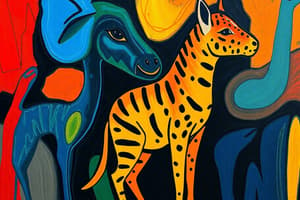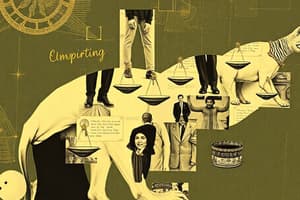Podcast
Questions and Answers
What is ethology?
What is ethology?
- The study of animal and human behavior in its natural environment within an evolutionary context (correct)
- The study of social behaviors in different cultures
- The study of human genetics
- The study of psychological theories
Who is known as the father of modern ethology?
Who is known as the father of modern ethology?
Konrad Lorenz
What is instinctive behavior?
What is instinctive behavior?
- Behavior that changes with age
- Behavior influenced by cultural factors
- Learned behaviors through experience
- Unlearned behavior released by specific external stimuli (correct)
What is imprinting?
What is imprinting?
The preference for mother in chimpanzees appears at ______ months of age.
The preference for mother in chimpanzees appears at ______ months of age.
Who studied the lack of emotional attachments in institutionalized children?
Who studied the lack of emotional attachments in institutionalized children?
What do attachment behaviors promote?
What do attachment behaviors promote?
Which of the following describes Bowlby's 4 phases of attachment?
Which of the following describes Bowlby's 4 phases of attachment?
At what age do infants develop an internal working model of their attachment figure?
At what age do infants develop an internal working model of their attachment figure?
What does Phase 4 - Partnership Behavior involve?
What does Phase 4 - Partnership Behavior involve?
After ______ months, ethologists doubt the ability of a child to develop normally if not attached.
After ______ months, ethologists doubt the ability of a child to develop normally if not attached.
Match the effects of separation in hospitalization with their descriptions:
Match the effects of separation in hospitalization with their descriptions:
Who studied the effects of a 'strange situation' on children?
Who studied the effects of a 'strange situation' on children?
What characterizes securely attached infants?
What characterizes securely attached infants?
What defines insecure-avoidant infants?
What defines insecure-avoidant infants?
What are insecure-ambivalent infants characterized by?
What are insecure-ambivalent infants characterized by?
Flashcards are hidden until you start studying
Study Notes
Ethology
- Ethology focuses on the study of animal and human behavior within their natural environments, emphasizing evolutionary contexts.
Konrad Lorenz
- Recognized as the father of modern ethology, Lorenz's work laid the foundation for understanding behavior from an evolutionary perspective.
Instinctive Behavior
- Instinctive behaviors are unlearned responses triggered by specific external stimuli, following defined action patterns that contribute to survival.
Imprinting
- Imprinting is a vital following behavior that occurs during a critical developmental period, influencing attachment bonds.
Chimpanzee & Mother Relationships
- Chimpanzees begin to show a distinct preference for their mothers around 3 months of age, highlighting early attachment tendencies.
John Bowlby
- Bowlby studied the effects of emotional attachment on institutionalized children, exploring the importance of maternal bonds.
Attachment Behaviors
- Attachment behaviors consist of gestures and signals that evolved to encourage proximity and connection between caregivers and children.
Bowlby's 4 Phases of Attachment
- Bowlby identified four key phases:
- Indiscriminate Response
- Focusing on Familiar People
- Intense Attachment/Proximity Seeking
- Partnership Behavior
Focusing on Familiar People (Phase 2)
- In this phase, infants focus on a primary caregiver, responding eagerly to their cues and engaging in enjoyable interactions.
Internal Working Model (12 months)
- By 12 months, infants develop an internal working model that assesses the stability and reliability of their attachment figure.
Partnership Behavior (Phase 4)
- During this stage, infants visualize their parent's behavior while separated, experiencing less anxiety during these separations.
Critical Attachment Period (18-24 Months)
- After 18 to 24 months, there's skepticism among ethologists regarding a child's ability to develop normally if they have not formed an attachment.
Effects of Separation During Hospitalization
- Children may undergo distinct emotional stages during separation, characterized by protest, despair, and eventual detachment.
Ainsworth's Contributions
- Ainsworth conducted home observations to study children's reactions in "strange situations," significantly contributing to attachment theory.
Securely Attached Infants
- These infants utilize their mothers as a secure base, exhibit distress when separated, and warmly greet their mothers upon return, indicating sensitive caregiving.
Insecure-Avoidant Infants
- This group shows independence, does not seek comfort from their mothers, exhibits no distress during separation, and ignores the mother upon return, indicative of insensitive caregiving.
Insecure-Ambivalent Infants
- Characterized by clinginess, extreme distress at separation, and uncertainty upon reunion with mothers, reflecting inconsistency in caregiving practices.
Studying That Suits You
Use AI to generate personalized quizzes and flashcards to suit your learning preferences.




